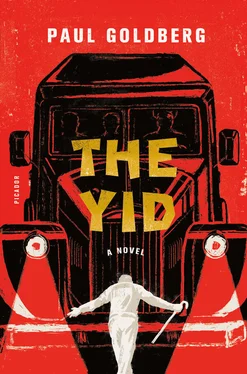The goats veer off into one of their customary absurdist improvisations.
KOGAN: What does Comrade Stalin teach us about anti-Semitism?
LEVINSON (with a Georgian accent) : Anti-Semitism is a form of cannibalism.
KOGAN: Its lowest form? Please explain this, Iosif Vissarionovich.
LEVINSON: No, comrade, you are mistaken. Anti-Semitism is the highest form of cannibalism!
KOGAN: Iosif Vissarionovich, if anti-Semitism is the highest form of cannibalism, what is its lowest form?
LEVINSON: Surgery, comrades, is the lowest form of cannibalism!
LEWIS: I have some questions.
KOGAN: Another concern, Mr. Lewis?
LEWIS: Yes, it’s about the art of being an actor. Years ago, when I still lived in Moscow, I heard Stanislavsky himself lecture on acting. I listened carefully. He said that an actor draws on his experiences in order to craft the character he depicts onstage. It was presented as something objective, measurable, reproducible. A method.
KOGAN: That’s the science they are cooking at the Moscow Arts Theater.
LEWIS: But isn’t it perilous?
KOGAN: Yes. If you depict Spartacus, or Bar-Kokhba, or what’s your Negro’s name?
LEWIS: Nat Turner.
KOGAN: If you think you are Spartacus, Nat Turner, or even our Lenin, you can get yourself into considerable trouble in the street. So what’s your question, Lewis?
LEWIS: My question is, how do we know that an actor leaves his character onstage after the curtain falls?
KOGAN: Would you like to answer Lewis’s question, komandir ?
LEVINSON: No.
LEWIS: Then, here’s a more troubling question: Does der komandir have the ability to distinguish his real self from the character or characters he plays or those he thinks he plays?
KOGAN: Onstage or in real life?
LEWIS: Either.
KOGAN: You mean, for example, right now?
LEWIS: Yes. Does he think he is onstage? Or let me put this differently: is he living in the world of real things?
KOGAN: Let’s ask him.
LEVINSON: Ask me what?
LEWIS: Let me try, Dr. Kogan. Komandir , are you able to distinguish reality from stage? Are you playing the part of the leader of a plot, or are you indeed being the leader of a plot?
LEVINSON: It’s a theoretical question. I’ve heard this kind of narishkeit for thirty years.
KOGAN: You have, I would imagine.
LEVINSON: No, this is serious: I look at it like a battle, Lewis. I go out there, hacking away, doing my best. All this Stanislavsky thing is just talk. I’m sick of it.
LEWIS: That’s what I feared.
KOGAN: So, Lewis, if this is indeed a plot, are you with me and with der komandir ?
LEWIS: Am I in the plot?
KOGAN: If that is what it is.
LEWIS: I guess I am. Zol zayn azoy.
LEVINSON and KOGAN (in unison): Zol zayn azoy!
It shall be so.
And if this were a play, the curtain would descend, and Act I would conclude.
Before the war, Arkady Leonidovich Kaplan wanted to become a diplomat, modeling himself on Maxim Litvinov, the Soviet Ambassador to the United States.
At school, he was learning German, but to be a stronger candidate for the diplomatic corps, he wanted to learn English as well. Studying on his own, he realized that he didn’t have a prayer of getting the pronunciation right, but he also knew that he was resourceful enough to clean it up later.
Arkady — everyone called him Arkashka — was eighteen when the war began. For reasons he never understood, he was made a medic and was sent to the front lines, where he remained for four years. “I crawled from Moscow to Berlin” was his line. It was hard to imagine how someone this lean and tall could get on the ground and crawl, but if there had been an Olympic event called Nordic crawling, Arkashka would have been a strong contender for gold.
After battles, Arkashka and his comrades crawled out of the trenches, dragging stretchers, looking for wounded Soviet soldiers. He had no training in medicine, but quickly became a master of applying tourniquets to near-severed limbs, whispering words of comfort to dying soldiers, making instant triage decisions, and identifying land mines and unexploded ordnance in pitch darkness.
He never carried a weapon. The stretcher, tourniquets, and medical supplies were load enough. Nobody cared what he did, and he felt cleaner without a gun. Whenever possible, Arkashka avoided wearing a helmet as well. It interfered with his ability to hear the moans of the wounded. The Germans didn’t hold fire when they knew medics were in the field, and neither did the Soviet Army. The chance that a new battle would start was always there.
His worst injury was a chipped tooth, a shrapnel wound from Stalingrad.
Often he came within a few meters of the Germans. When he got too close and was challenged, he was able to respond in a faux Bavarian accent. In German, his pronunciation was exemplary.
The orders were to bring back only the Soviet soldiers, but once he brought back a German medic, who had been shot once through the back, presumably by a Soviet sniper. There was something student-like about that young man. Arkashka couldn’t bear to leave him to bleed out in the mud. The medic was barely breathing by the time he dragged him in to the Soviet positions.
In his rucksack, the young man carried a separate waxed canvas bag that contained a copy of Der Process , by Franz Kafka, in German. A corner of the tome was blown off by a sniper’s bullet. The text survived for three reasons: (1) the medic kept the book in the rucksack, (2) the sniper’s bullet pierced the medic from the back, producing a crater-like exit wound in the abdomen, and (3) causing him to fall forward and bleed out into the snow. Had the medic been hit in the chest or the abdomen and fallen on his back, the blood would have surely destroyed Der Process in a manner Kafka would have appreciated.
Arkashka read that book in one sitting the next day. Realizing that a book this important must be passed on, he gave it to a surgeon he didn’t know well, but nonetheless trusted. He had to be careful, because the Special Department could have easily classified Der Process , a book in German, as Nazi propaganda, which would have resulted in an investigation, trial, and execution.
After the war, Arkashka abandoned his dreams of diplomacy and enrolled in the First Medical Institute. There, by a massive formaldehyde vat containing body parts, a professor of surgery greeted him with a proper military salute. Generally, colonels do not salute privates, but in this case rank was beside the point. They were civilians now.
This professor was none other than Aleksandr Sergeyevich Kogan, the army surgeon to whom Arkashka had entrusted a copy of Der Process .
They spent the evening drinking vodka at Kogan’s apartment on Ulansky Street. Frontoviki , men who were at the front, are a brotherhood. That night, they read their favorite passages from The Trial . For both men, these included the opening and the very end: Like a dog.
* * *
Five years later, on February 16, 1953, at around 3:47 a.m., an ambulance was summoned to the apartment of Admiral Pyotr Abrikosov on Frunzenskaya Embankment.
The complaint: the admiral’s seventy-eight-year-old mother, who was paralyzed on the right side a year ago, had become unresponsive.
On ordinary nights, the ambulance crew included a doctor, a driver, and a medic. However, the medic was ill, and only the doctor and the driver were available to make the call.
“Did you know that Jesus Christ was a Yid doctor?” asked Dr. Arkady Leonidovich Kaplan, the doctor on call, as the driver, Spartak Islamov, stepped on the gas pedal and lazily turned on the siren.
Читать дальше












